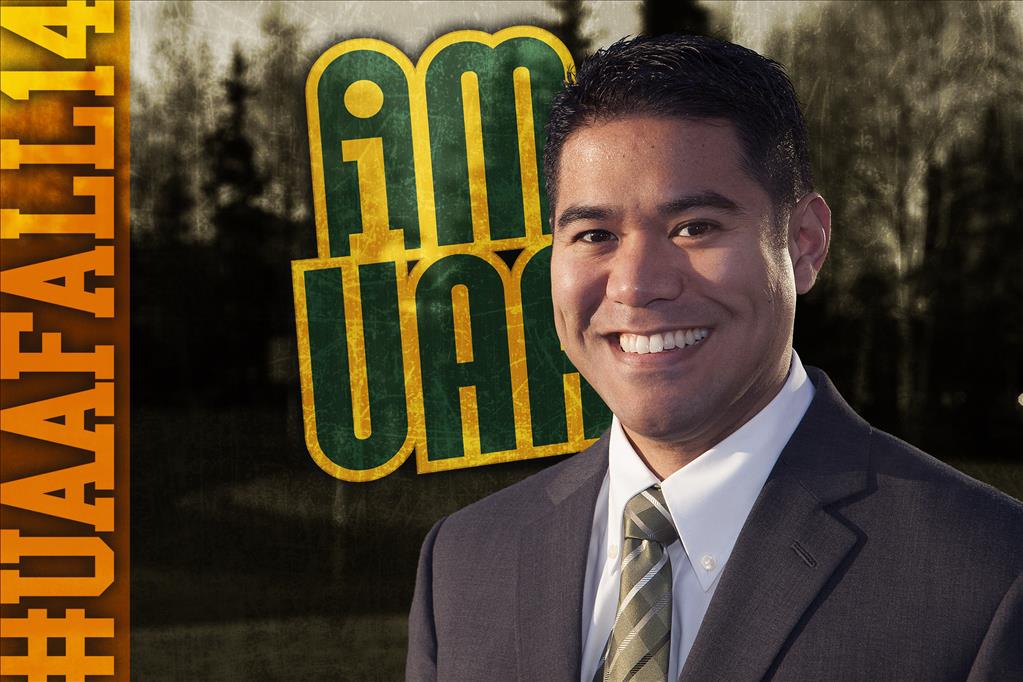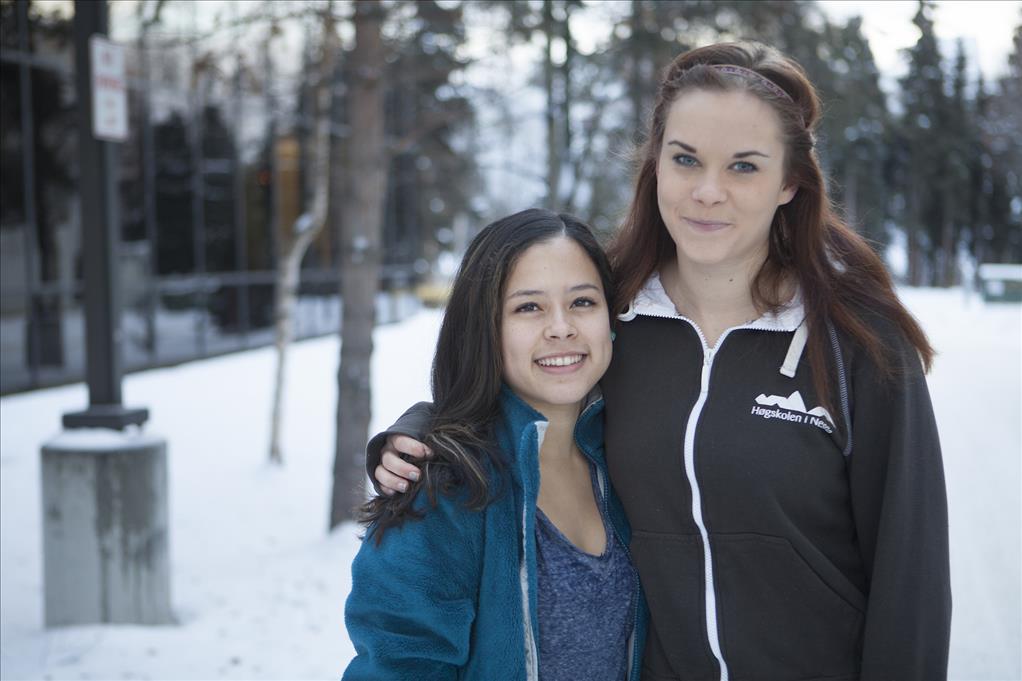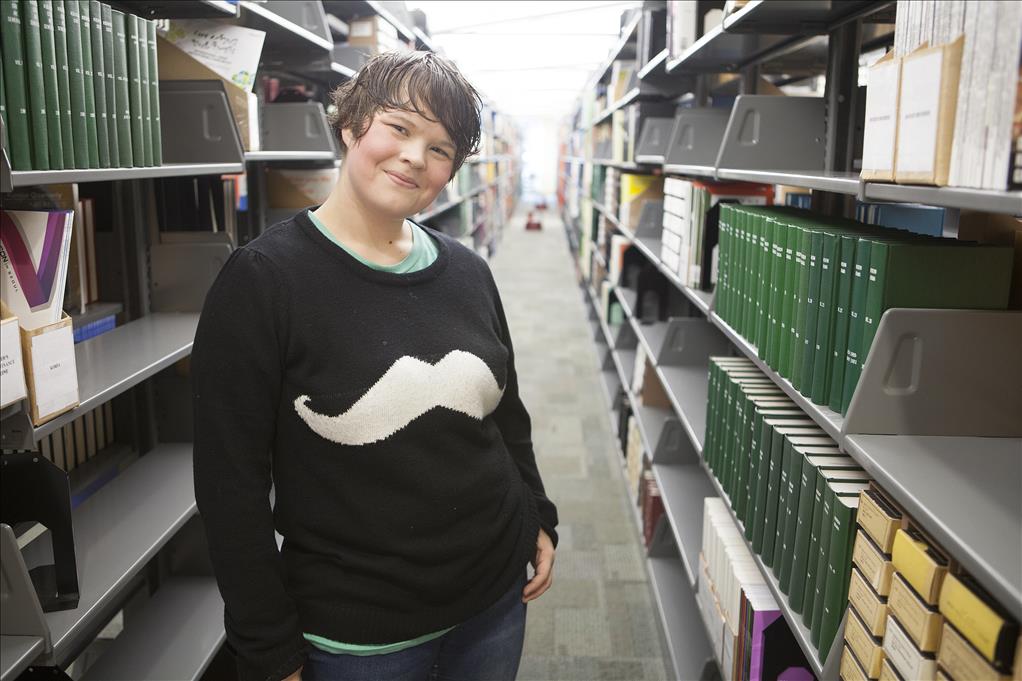On campus safety: A chat with the late night eyes and ears of UPD
by Jamie Gonzales |
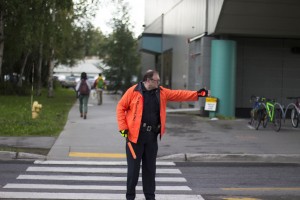
Officer Paul Honeman directing traffic at UAA. (Photo by Ted Kincaid/University of Alaska Anchorage)
It's Friday night at 10 p.m. and the workday is just getting started for Officer Paul Honeman and Officer Guy Dodge. Veteran police officers with nearly 60 years of combined law enforcement experience, they are scanning University Police Department (UPD) radios with one ear and with the other, fielding questions about campus safety, community policing and why they chose to work in law enforcement.
Even during the more languid summer months, UAA never sleeps, so neither does UPD. With a roster of 17 officers, they're tasked with maintaining the safety and security of UAA's campuses — all the way from Mat-Su College to Kenai Peninsula College (with the help of local agencies) — 365 days a year, 24 hours a day. They're most frequently called for theft, vandalism and trespass cases, they said, but this particular Friday night started off quiet.
These two uniformed officers aren't relaxed, though. Even though they agreed 99 percent of the people who filter through campus are here for admirable reasons, it's keeping tabs on that 1 percent that has them perpetually on their toes.
"There's no such thing as routine," said Honeman.
"The longer you do this, the more you're able to pick out the predators from the prey," said Dodge. "Up here you get to know the potential prey and wave and you see the predators and scowl and make yourself a high-profile presence. It's hard to quantify how many crimes you prevent."
That kind of radar is hard to turn off and makes Dodge, he admitted, a hyper-vigilant Saturday Market companion when he's out with his family.
"I don't want to freak you out, but when you rolled into the lot tonight, you were in an older model silver mini van, traveling alone. I didn't consciously size you up, but I noticed," said Dodge. (This writer is happy she wore her least criminal-looking raincoat.)
Dodge spent decades working in Utah — his law enforcement career began at another university, University of Utah — before relocating to Alaska. He's in his fourth year with UPD. Honeman spent 23 years with the Anchorage Police Department (APD) before being elected to Anchorage Assembly in 2010 and, concurrent with his Assembly term, coming to work for UAA a year ago.
On being seasoned officers
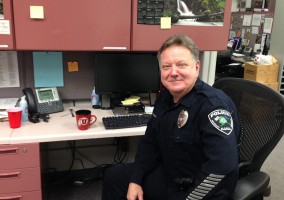
UAA is the second university Officer Guy Dodge has worked for and he enjoys the professionalism of UPD. (Photo by Ted Kincaid/University of Alaska Anchorage)
"There's a song...I ain't as good as I once was..." mused Honeman.
"But I'm as good once as I ever was," finished Dodge with a laugh.
Experience, they both agreed, has made them better officers. They don't mind spending the extra minutes trying to de-escalate a situation if it looks like it might make for a happier ending for all parties. And they don't mind putting in the hours to get to know students and staffers in UAA's residence halls, something that helps them learn who should and shouldn't be hanging around in on-campus living quarters. They're also great at connecting students in crisis with the community resources they need.
In addition to investigating everything from property crimes to assault, UPD has to keep an ear out for reports of agitated wildlife roaming campus sidewalks and trails. Three recent visitors to campus, a mama black bear and her two cubs, wound up with some UPD escorts during their bolder appearances on the east side of campus in June.
File this one under Only in Alaska: "I once fielded a call from a guy who'd run face-first into the side of a moose because he was engrossed in his phone," said Dodge.
Both Honeman and Dodge are proud to be part of an agency that's committed to service as well as law enforcement. UPD offers safety briefings and crime prevention tips in on-campus housing, as well as periodic RAD Training (Rape Agression Defense) sessions each semester. They also work closely with UAA's administrators to stay ahead of the curve in training for incident management — earthquakes, active shooters, etc.
"As emergency responders, not only are we being paid for what we do, by we're being paid for what we might have to do," said Dodge.
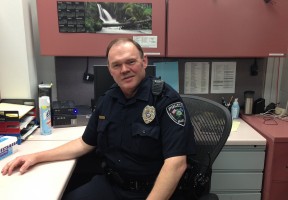
Officer Paul Honeman has more than 25 years of experience in law enforcement. (Photo by Ted Kincaid/University of Alaska Anchorage)
Beyond safety and security, the officers also concern themselves with the campus community's mental health. This last round of finals in the spring found Officer Honeman carrying on a tradition started by a retired 31-year UPD veteran, Officer Fischer. She asked Honeman to please take over her desk drawer of candy and consider handing it out to students during finals prep and finals week.
"I had some fun with it," he said. "This one young lady was waiting on a parking spot. I could see her pounding on the steering wheel, so I pulled up beside her. She said, "I'm late and I'm waiting for these guys to leave. I gotta get in there.' So I said, 'It looks like you could use an attitude adjustment.' She was a little concerned. But I reached up with this bag of candy and said, 'Chocolate has been known to relieve stress, give you a little boost of energy. It might be just the thing you need.' She looked at me and heaved this big sigh of relief and said, 'Seriously? I can have candy?'"
So, if you see the shiny black and white UPD car behind you some time in the near future, don't panic. They may just want to offer you an Almond Joy. Unless you just ran that stop sign. Did you just run a stop sign? Sheesh. Time to brace yourself for the full force of a police scowl. And a traffic ticket.
To contact UPD with questions or concerns, call (907) 786-1120. Seriously, program it into your phone. In an emergency, dial 911 of course and dispatchers will connect you with nearby resources, but there are UPD officers ready to respond to your emergency and non-emergency calls 24/7 here on campus.
This story written by Jamie Gonzales, UAA Office of University Advancement
 "On campus safety: A chat with the late night eyes and ears of UPD" is licensed under a Creative Commons Attribution-NonCommercial 4.0 International License.
"On campus safety: A chat with the late night eyes and ears of UPD" is licensed under a Creative Commons Attribution-NonCommercial 4.0 International License.










